Democratic Group Aims To Spend $20 Million Boosting STEM Candidates
- Oops!Something went wrong.Please try again later.

Then-Virgin Galactic CEO George Whitesides speaks at a hangar at Mojave Air and Space Port in Mojave, California, on Sept. 25, 2013.
A group boosting Democratic candidates with a background in science and technology plans to spend $20 million to $25 million on the 2024 elections, the organization’s executive director told HuffPost.
314 Action, which formed after the 2016 elections, is targeting 27 House districts, many of them won by President Joe Biden in 2020 but now held by a Republican, as well as key state-level races in Pennsylvania, Delaware and North Carolina.
“I think we’ve really cracked the code on what makes a great candidate in these [swing] districts,” said Joshua Morrow, 314 Action’s executive director. “It’s going to be our candidates that people want to support.”
The group already has one top-tier recruit in a competitive district: George Whitesides, a former NASA chief of staff and CEO of Virgin Galactic, announced his plans to challenge GOP Rep. Mike Garcia in California’s 27th District, which encompasses a swath of suburbs to the north of Los Angeles.
The 27th is emblematic of many of the districts 314 Action is targeting. While President Joe Biden easily won it in 2020, taking more than two-thirds of the vote, Garcia won reelection by seven percentage points in 2022 after national Democrats struggled to find the resources to air ads in the ultra-pricey Los Angeles media market.
The group is also targeting Delaware’s gubernatorial race, lieutenant governor’s races in North Carolina and Delaware and treasurer races in Oregon and Pennsylvania.
Much of the group’s funding will be spent helping candidates get through competitive primaries. The group backed a host of winning candidates in 2022, including Arizona Sen. Mark Kelly, a former astronaut, and two new House members: Eric Sorensen of Illinois, a meteorologist, and Yadira Caraveo, a pediatrician.
Morrow argues candidates with a background in STEM can appeal to both the Democratic Party’s liberal base and to swing voters, especially as science-based issues like pandemic prevention and climate change grow in importance.
“They’re problem-solvers. Scientists aren’t programmed to argue their facts, they’re programmed to find the facts. Lawyers are taught to argue their facts,” Morrow said. “And I think that makes them able to work across the aisle in a way other politicians can not.”
“During the pandemic, wouldn’t it have been great if we had a president who actually knew about pandemics?” Morrow asked rhetorically. “And wouldn’t it be great if experts could write climate change bills instead of the energy companies?”
